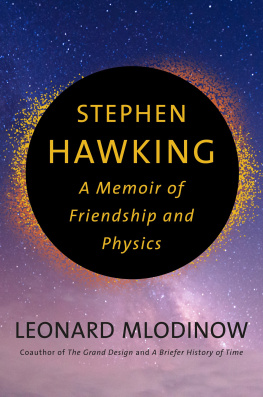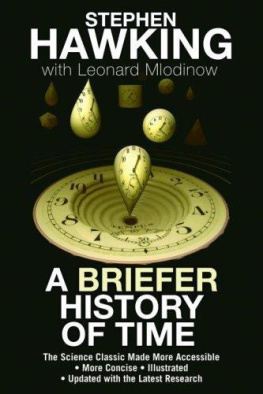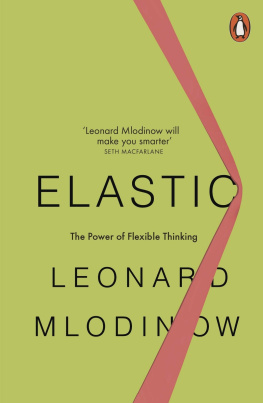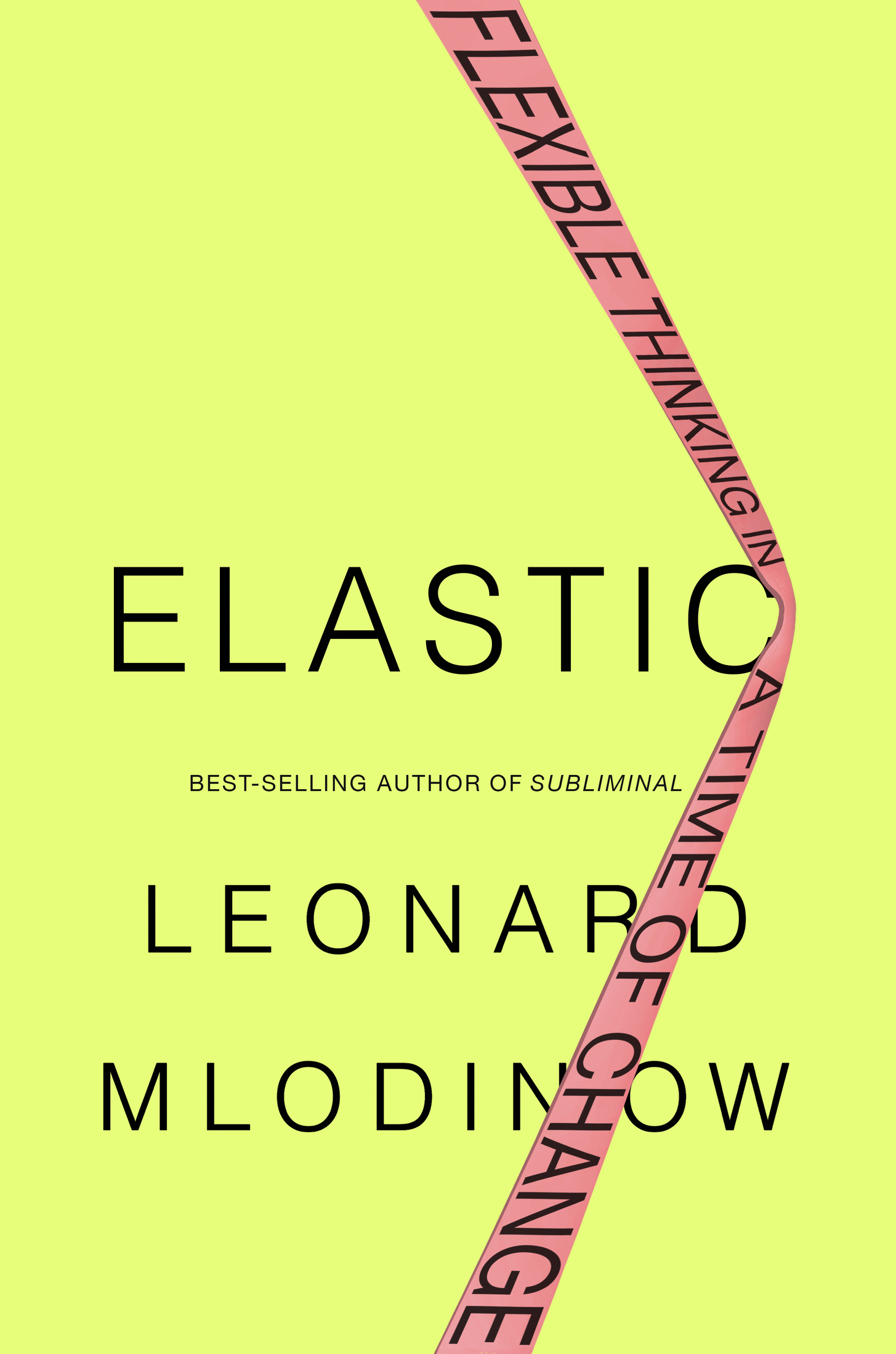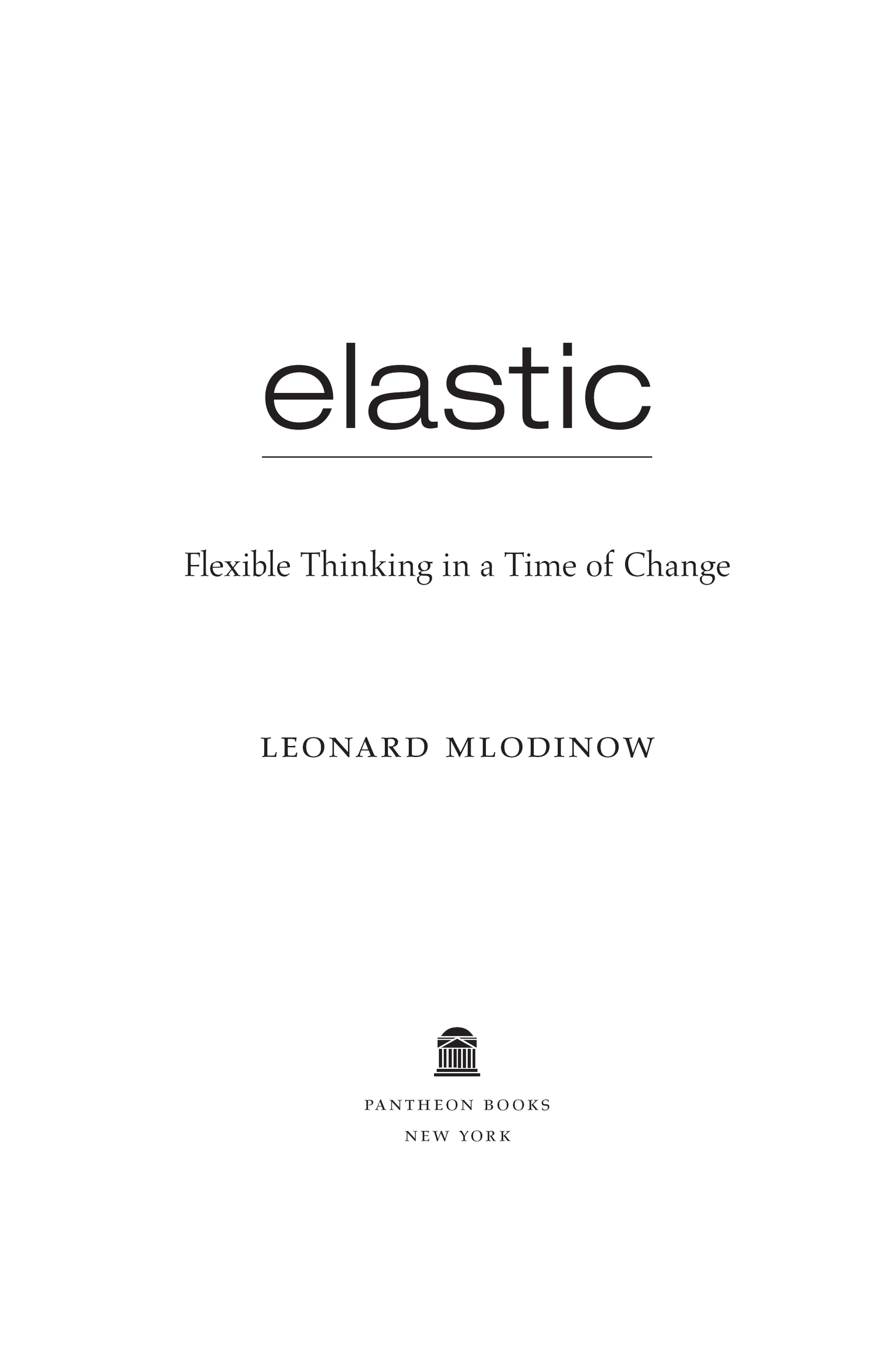Contents
ALSO BY LEONARD MLODINOW
The Upright Thinkers: The Human Journey from Living in Trees to Understanding the Cosmos
Subliminal: How Your Unconscious Mind Rules Your Behavior
War of the Worldviews (with Deepak Chopra)
The Grand Design (with Stephen Hawking)
The Drunkards Walk: How Randomness Rules Our Lives
A Briefer History of Time (with Stephen Hawking)
Feynmans Rainbow: A Search for Beauty in Physics and in Life
Euclids Window: The Story of Geometry from Parallel Lines to Hyperspace
FOR CHILDREN (with Matt Costello)
The Last Dinosaur
Titanic Cat
Copyright 2018 by Leonard Mlodinow
All rights reserved. Published in the United States by Pantheon Books, a division of Penguin Random House LLC, New York, and distributed in Canada by Random House of Canada, a division of Penguin Random House Canada Limited, Toronto.
Pantheon Books and colophon are registered trademarks of Penguin Random House LLC.
Grateful acknowledgment is made to Basic Books for permission to reprint an excerpt from Perfectly Reasonable Deviations from the Beaten Track, edited by Michelle Feynman, copyright 2005 by Michelle Feynman. Reprinted by permission of Basic Books, an imprint of Perseus Books, LLC, a subsidiary of Hachette Book Group, Inc.
Library of Congress Cataloging-in-Publication Data
Name: Mlodinow, Leonard, [date], author.
Title: Elastic : flexible thinking in a time of change / Leonard Mlodinow.
Description: New York : Pantheon Books, 2018.
Identifiers: LCCN 2017015377. ISBN 9781101870921 (hardcover). ISBN 9781101870938 (ebook). ISBN 9780375715242 (export edition).
Subjects: LCSH : NeurosciencesResearch.
NeurologyTechnological innovations. Decision making.
BISAC: SCIENCE / Life Sciences / Neuroscience.
BUSINESS & ECONOMICS / Decision-Making & Problem Solving.
Classification: LCC RC 337 . M 57 2018. DDC 612.8072dc23. LC record available at lccn.loc.gov/2017015377.
Ebook ISBN9781101870938
www.pantheonbooks.com
Cover design by Tyler Comrie
v5.2
a
For Donna Scott
Contents
Introduction
The Demands of Change
On July 6, 2016, Niantic, a forty-person startup company founded by ex-employees of Googles Geo division, launched Pokmon Go, an augmented reality game that employs a phones camera to let people capture virtual creatures that appear on their screens as if they exist in the real world. Within two days the app had been installed on more than 10 percent of all Android phones in the United States, and within two weeks it had thirty million users. Soon iPhone owners were spending more time each day on Pokmon Go than on Facebook, Snapchat, Instagram, or Twitter. Even more impressive, within days of the games release, the words Pokmon Go drew more searches on Google than the word porn.
If youre not a gamer, you might roll your eyes or shrug at all that, but in the business world, the events were hard to ignore: The game generated an astonishing $1.6 million in revenue each day from domestic Apple users alone. Just as important, it added $7.5 billion to Niantics market value virtually overnight, and within a month it had doubled the stock price of Nintendo, the company that owns the Pokmon trademark.
In its first six months of existence, more than six hundred million people downloaded the Pokmon Go app. Contrast that with some of the greatest successes of the early 2000s. Facebook launched in 2004, but it didnt hit the thirty-million-user mark until 2007. The hugely popular World of Warcraft game, also released in 2004, took six years to climb to its peak of twelve million subscribers. What seemed like pedal-to-the-metal growth back then became, ten years later, life in the slow lane. And though no one can predict what the next big new thing will be, most economists and sociologists expect that society will only continue to morph faster in the foreseeable future.
But to focus only on the speed of Pokmon Gos ascent is to miss much of the point. The games massive success might not have been predictable, but neither was it accidental. In creating the app, Niantic made a series of innovative and forward-thinking decisions concerning the use of technology, such as piggybacking on the GPS and camera capabilities of a cell phone and leveraging cloud computing to power the app, which provided a built-in infrastructure and a capacity to scale. The game also took advantage, like nothing before it, of app-store economics, a business model that hadnt even been invented when World of Warcraft launched. In that now familiar approach, a game is given away free of charge and makes its money by selling add-ons and upgrades. Maintaining that revenue stream was another challenge. In the interactive entertainment industry, a game can start out popular and still have the shelf life of raw oysters. To avoid that fate, Niantic surprised many with a long campaign to aggressively update the app with meaningful features and content. As a result, a year after its launch, 65 million people were still playing the game each month, and revenues had reached $1.2 billion.
Before Pokmon Go, the conventional wisdom was that people didnt want a game that required physical activity and real-world interaction. And so, despite all the innovation in Silicon Valley, the Pokmon Go developers were often admonished that gamers just want to sit and play. But the developers ignored that widely held assumption, and by leveraging existing technologies in a novel way, they changed the way game developers think. The flip side of the Pokmon Go story is that if your thinking is not deft, your company can quickly sink. Just look at BlackBerry, Blockbuster, Borders, Dell, Eastman Kodak, Encyclopaedia Britannica, Sun Microsystems, Sears, and Yahoo. And they are just the tip of the icebergin 1958, the average life span of companies in the S&P 500 was sixty-one years. Today it is about twenty.
We have to face analogous intellectual challenges in our daily lives. Today we consume, on average, a staggering 100,000 words of new information each day from various mediathe equivalent of a three-hundred-page book. Thats compared with about 28,000 a few decades ago. Due to innovative new products and technologies, and to that proliferation of information, accomplishing what was once a relatively straightforward task can now be a bewilderingly complex journey through a jungle of possibilities.
Not long ago, if we wanted to take a trip, wed check out a guidebook or two, get AAA maps, and call the airline and hotels, or wed talk to one of this countrys eighteen thousand travel agents. Today, people use, on average, twenty-six websites when planning a vacation, and must weigh an avalanche of offers and alternatives, with prices that not only change as a function of when in the day you wish to travel but also as a function of when you are looking. Simply finalizing the purchase once youve decided has become a kind of duel between business and customer, with each vying for the best deal, from his or her vantage point. If you didnt need a vacation when you started planning one, you might by the time you are done.
Today, as individuals, we have great power at our fingertips, but we must also routinely solve problems that we didnt have to face ten or twenty years ago. For instance, once, while my wife and I were out of the country, my daughter Olivia, then fifteen, gave the house sitter the night off. Olivia then texted us asking if she could invite a few friends over. A few turned out to be 363thanks to the instant invitations that can be communicated over cell phones on Instagram. As it turned out, she wasnt entirely to blameit was an overzealous friend who posted itbut its a calamity that wouldnt have been possible when her brothers were that age, just a handful of years earlier.





